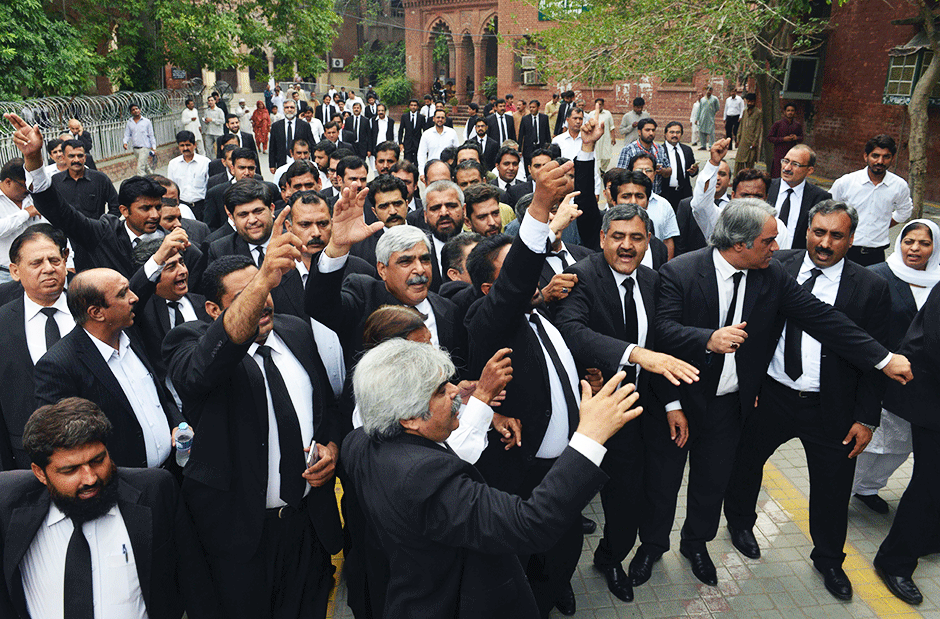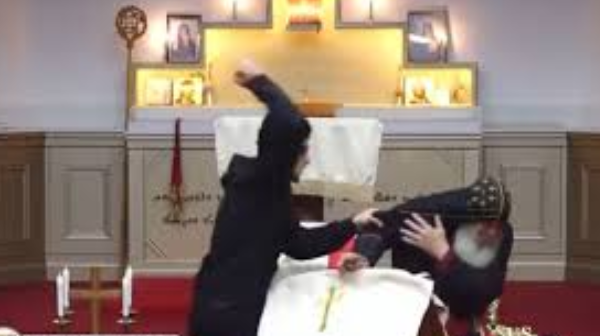Pakistan is now in the throes of the third wave of the Covid-19 global pandemic with infections, positivity rate and deaths all on the rise. Yet Pakistan’s judicial system in general and legal fraternity in particular seem undeterred by the havoc wreaked by the deadly disease and unburdened by any compulsion to follow the standard operating procedures (SOPs) to reduce the risk of spreading the virulent infection.
Not that the disease has not taken its toll on the judiciary. Chief Justice of Peshawar High Court (PHC) Justice Waqar Seth died after contracting with Covid-19 last November. The Chief Justice of Pakistan Gulzar Ahmed has been said to self-quarantine for Covid-19. Several lawyers across Pakistan have lost their lives after contracting Covid-19.
And yet there are no SOPs in place, no organized or systemic effort to take precautionary measures against the possibility of infection, in particular when one visits the overcrowded sessions courts of the country.
Protection from harm from disease is a fundamental right of the judges, lawyers, and litigants alike. Several countries of the world have taken certain steps to safeguard this right. In Germany, for instance, it is up to the individual court to decide whether to hold hearings and take precautionary or safety measures. In contrast, the majority of judicial proceedings have been postponed in Greece. In Spain, procedures were suspended after the state of alarm was established, but the arrangement provides for a number of exceptions, given the importance and essential nature of certain processes and actions.
In spite of all these variations of approach, there is one point of near-universal agreement: all states are working towards reduction of taxes and allowing court proceedings by means of video conferences.
Soon after coronavirus was declared a global pandemic by the World Health Organization last year, the Islamabad High Court (IHC) and Sindh High Court (SHC) ordered release on bail by the police of under-trial prisoners (who meet a certain criteria, subject to certain conditions). However, both the decisions were overturned in appeal when the Supreme Court of Pakistan ruled the suspects were more of a threat to the society than Covid-19 was top them.
In November last year, a lawyer infected with coronavirus presented himself in the court of the Chief Justice of Pakistan after his application for adjournment of the case was turned down. “I am appearing in your court despite having corona, “Barrister Dr Adnan Khan told the Chief Justice of Pakistan Gulzar Ahmed, who was hearing the case in a packed Courtroom No.1 in Islamabad.
“Why have you shown up in court (while you are suffering from Covid-19)?” His Lordship made no secret of his displeasure. “You are playing with others’ lives.” Barrister Khan said he had submitted an application to adjourn a case in a different court after testing positive for the virus, but that request was rejected. If the venerable counsel hoped to help create a precedent that would disambiguate the matter, he succeeded: His Lordship ordered him to immediately leave the courtroom and submit his arguments in writing.
In a similar incident last month, a witness flew all the way from Karachi to reach Islamabad’s accountability court because the summonses warned him of serious consequences for absenting. He waited for hours in the crowded courtroom before rising to the rostrum to request the judge to record his statement since he was unwell, suffering from Covid-19. The sudden revelation caused alarm in the courtroom. The judge, his staff, and lawyers left in hurry while the witness was quickly sent on his way immediately.
More recently, Judges and officials at three Islamabad courts tested Covid-19 positive, prompting to seal the courts on 1 April.
On the upside, many courts have now started conducting hearings through video link. However, recording of witness testimony is still being done in person. The authorities would do well to amend the Qanoon-e-Shahadat (Evidence Act) enabling the courts to rely more on electronic evidence and proceeding the entire trial through video link.
The criminal justice system has been and certainly will continue to be impacted by coronavirus concerns. So, the way criminal defence attorneys communicate with clients is also changing in some respects. Most jails, prisons, and other detention centres have adjusted operating procedures in response to the coronavirus. Many of these institutions have suspended all contact visits.
Inexplicably, however, one of the learned professions continues to flout the SOPs everybody from the president to the local shopkeeper are expected to follow.
Inexplicably, our learned counsels are failing to realise fail to realise they are putting other lives in danger by holding meetings and elections and celebrate victories in their barrooms while ignoring the Covid-19 SOPs. The lives they put in jeopardy include the lives of their fellow counsels and associates, court staff, their clients, and even their families. And among them are influential lawyer leaders who should know better considering they are the role models for the younger crop.
Lawyers have provided leadership at critical junctures in our history.
Quad-e-Azam Muhammad Ali Jinnah and Zulfikaar Ali Bhutto were both lawyers. In recent memory the lawyers’ movement provided indispensable leadership that helped the nation see off the Musharraf’s military rule. One would expect this learned profession to rise to the occasion one more time and show leadership in fighting Covid-19. For that, however, they must first embrace the SOPs in their spaces.
In situations where face-to-face communication between a client and attorney is necessary, experts recommend taking certain precautions to reduce the risk of spreading the infection. Practicing social distancing (staying at least six feet away from other people) is a way of slowing the spread of COVID-19. Skipping the handshake and staying a safe distance from each other have been widely advised, as have been sanitisation of hands and disinfection of frequently used surfaces. Perhaps most important, when an in-person is necessary, choose a location that’s outdoors or in an open, well-ventilated area.
The urgency of the legal profession starting strict implementation of Covid-19 SOPs cannot be overemphasized not only to protect the lives of the members of the professions and those who interact with them but also to set a good example for other callings to follow. Acumen and courage are the two defining qualities of great lawyers, many of whom we are fortunate to have in our midst. It is time they took it upon themselves to lead the profession in cleaning up its act.










